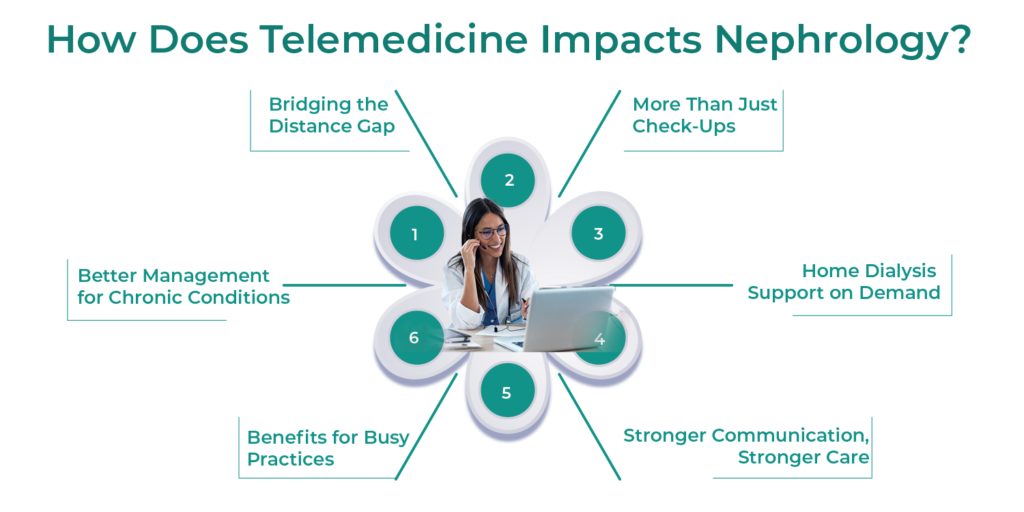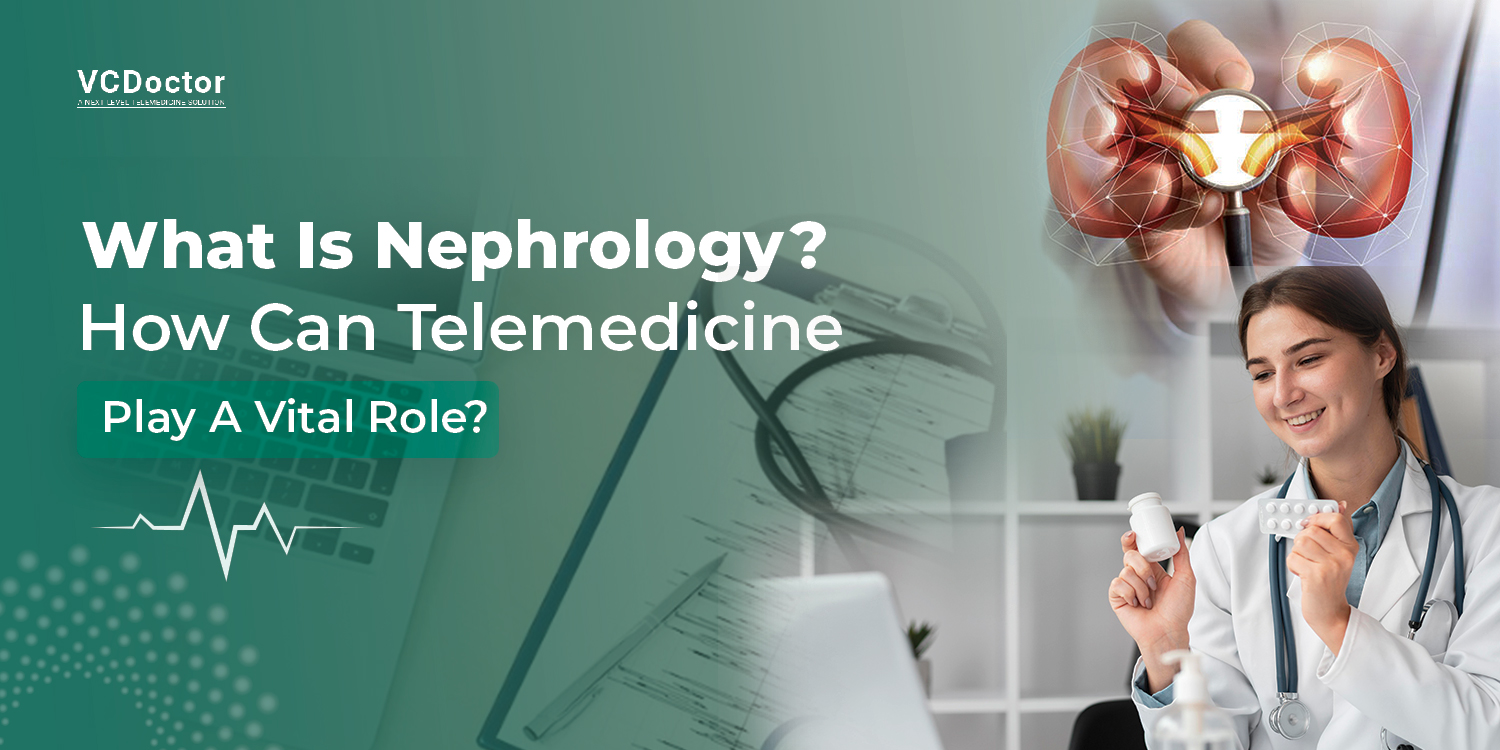What is Nephrology? How Can Telemedicine Play a Vital Role?
Telemedicine, like any other nephrology technology, can be vital in advancing care to a maximum number of people. The WHO report further highlights the Burden of Kidney Disease (CKD) on the global population and economy.
Do you know 1 in 10 people in the world have CKD? And, that’s not the worst part. Every year millions of CKD patients die from non-availability of timely care. Nephrology telemedicine can bring the right care at the right time. In this blog, we delve deeper into how telemedicine app can do so.
Table of Contents
- What is Nephrology?
- What Does A Nephrologist Do?
- What is a Nephrologist?
- What is a pediatric nephrologist?
- What Conditions Do Nephrologists Treat?
- How do you become a nephrologist?
- What types of tests and procedures does a nephrologist perform?
- What is the difference between a nephrologist and a urologist?
- Role of Telemedicine Software in Nephrology
- How Does Telemedicine Impacts Nephrology?
- When should I see a nephrologist?
- What does a nephrologist do on a first visit?
- How do I prepare for a nephrology appointment?
- Why Choose VCDoctor Telemedicine?
- Wrapping Up!
- VCDoctor Telemedicine for Nephrology: FAQs
What is Nephrology?
Nephrology is a specialist field in medical science. It deals with the diagnosis and treatment of diseases related to the kidneys. A Nephrologist is a certified kidney expert. They ensure that our bean-shaped organs are healthy and doing their job perfectly.
Kidneys are present just below the ribcage on either side of the spine. It performs numerous vital functions like:
- Removing waste and excess fluid from the blood
- Maintaining your body’s electrolyte balance
- Releasing hormones with functions such as managing blood pressure
A nephrologist is well aware of how important technology is in modern healthcare. Patients with End-Stage Renal Disease (ESRD) are recommended home dialysis- which relies significantly on remote monitoring solutions,
What Does A Nephrologist Do?
People who study & treat kidney-related diseases are termed Nephrologists or kidney doctor. They not only have expertise on diseases that specifically affect the kidney, but they’re also very intellectual about how kidney disease or dysfunction can affect other body parts.
Although the primary care doctor will function to help or prevent and treat the early stages of kidney disease, a nephrologist may be called upon to help diagnose and treat more severe or complex kidney conditions.
What is a Nephrologist?
A nephrologist is a doctor who specializes in taking care of kidneys. The kidneys are the most essential bean-shaped organs in the human body, keeping the body healthy. They clean the blood by removing waste, extra water, and minerals that aren’t needed via urine (pee). If your kidneys aren’t working well or if you’ve any condition like kidney disease, high blood pressure, or kidney stones, then a nephrologist will take care of it and provide the best care.
What is a pediatric nephrologist?
A pediatric nephrologist is a doctor who treats kidney problems, especially in newborn babies, children, and young adults.
What Conditions Do Nephrologists Treat?
Nephrologists conduct several types of diagnosis and treat the following conditions:
- Blood or protein in the urine
- Chronic kidney disease
- Kidney stones, although a urologist may also treat this
- Kidney infections
- Kidney swelling due to glomerulonephritis or interstitial nephritis
- Kidney cancer
- Polycystic kidney disease
- Hemolytic uremic syndrome
- Renal artery stenosis
- Nephrotic syndrome
- End-stage kidney disease
- Kidney failure, both acute and chronic
A nephrologist can also be involved when other factors cause kidney disease or dysfunction, including:
- High blood pressure
- Diabetes
- Heart disease
- Autoimmune conditions, such as lupus
- Medications
How do you become a nephrologist?
Here’s how you can become a nephrologist:
1st – Finish your college (4 years)
2nd – Go to medical school (4 years)
3rd – Complete your residency training (3 years) and mainly focus on internal medicine or pediatrics
4th – Do a fellowship in nephrology (2-3 years) to specialize in kidney care. Some people also take an extra year to focus on transplants or procedures
5th – Get certification by passive exams to become a licensed nephrologist
What is transplant nephrology?
Transplant nephrology is a specialized field where the main focus is on kidney and pancreas transplants. Doctors in this field help those people before and after getting a new kidney or pancreas to ensure that the transplant works well and that the new organ stays healthy.
What is interventional nephrology?
Interventional nephrology mainly focuses on helping those people who need dialysis (a treatment that filters blood when kidneys can’t). A kidney doctor near me ensures that blood vessels used for dialysis stay open and healthy. There are several other procedures they perform like:
- Placing or removing catheters
- Removing blood clots
- Doing histograms
- Performing kidney biopsies
- Inserting stents
What types of tests and procedures does a nephrologist perform?
Nephrologists do different tests and procedures to check how well your kidneys are working and treat kidney problems. Some of the common tests and procedures are:
- Imaging Tests: Where X-rays, CT scans, or Ultrasounds are used to see the kidneys and check for any issues.
- Dialysis: If your kidneys can’t filter waste, a machine cleans your blood and returns it to your body.
- Kidney Biopsy: The doctor takes a tiny piece of your kidney to figure out what’s causing the problem.
- Kidney Function Tests: Blood and urine tests to find out if your kidneys are functioning properly.
- Kidney Transplant Care: If you need a new kidney, a Nephrologist will help you prepare for the transplant and guide you for recovery afterward.
What is the difference between a nephrologist and a urologist?
Here’s the key difference between nephrologist vs urologist:
| Nephrologist | Urologist |
| Mainly focus on kidney problems and functioning issues | Mainly focus on the entire urinary system and reproductive health |
| Treat conditions like kidney failure and high blood pressure | Treat conditions like kidney stones, bladder infections, and urinary incontinence |
| Doesn’t perform surgeries | Perform surgeries such as removing kidney stones or tumors |
| Handle kidney-related medical management, like dialysis | Handles surgical and non-surgical treatments of urinary and reproductive issues |
| Best for kidney function problems | Best for urinary or reproductive system issues and surgical needs |
Role of Telemedicine Software in Nephrology
Telemedicine in rural areas has maximized the capacity and ability to render timely and acceptable healthcare for cases with ESKD. Effective dialysis care requires a staff nephrologist instantly available to coordinate care for dialysis cases and a proper structure for water treatment systems and dialysis outfits.
For these reasons, clinicians in rural hospitals generally transfer cases taking dialysis to other, larger hospitals, occasionally hundreds of long hauls down. These transfers reflect broader poverties in access to timely and effective specialty care services and may lead to poorer issues for the rural population.
Telemedicine software is changing how nephrologists (kidney doctors) take care of patients. Here’s how:
- See patients from anywhere: No more long trips for patients in remote areas.
- Monitor health remotely: Monitor vitals and medication use for better care.
- Stay connected: Talk to patients regularly for better communication and education.
- Save time and money: Less travel for both patients and doctors saves everyone time and resources.
Overall, telemedicine nephrology software helps nephrologists provide better care for their patients, making it a win-win for everyone.
How Does Telemedicine Impacts Nephrology?
Since the COVID-19 pandemic, telemedicine has emerged as a vital tool to offer on-time care to people with kidney concerns and diseases. Here’s a breakdown of its impact:

Bridging the Distance Gap:
Telemedicine helps patients living in remote areas who are far away from a kidney specialist. They now access expert nephrologists via their smartphones or other internet-connected devices. Plus, virtual consultations also ensure that nephrologists can see more patients with the time saved.
More Than Just Check-Ups:
Not all patients need in-person visits. Some need routine check-ups and monitoring which telemedicine helps them do easily. This saves time to focus on more complex cases, ensuring everyone gets the care they need.
Better Management for Chronic Conditions:
Patients with CKD need 24*7 monitoring. With telemedicine nephrology, doctors can not just monitor patients but also interact with caretakers in real-time. High-quality remote care allows providers to detect complications early. They can change medication or adjust treatment plans better.
Home Dialysis Support on Demand:
Nephrology telemedicine is a lifesaver for patients on home dialysis. Most telemedicine platforms support monitoring devices. Providers can collect reports conveniently, offer guidance, and address any concerns remotely. Both patients and providers are empowered to manage care effectively.
Benefits for Busy Practices:
Most telemedicine nephrology platforms come with smart tools and advanced features. They streamline workflows and also automate routine tasks such as appointment booking, reminders, etc. This allows providers to focus more on care, and also use their resources more efficiently.
Stronger Communication, Stronger Care:
Modern care, especially in ESRD and CKD cases, has to be timely and coordinated. Telemedicine nephrology helps meet both these requirements. With features like video/chat consultations, e-prescriptions, EHR, and more- a telemedicine platform allows better care communication and coordination. It ensures everyone is on the same page when it comes to a patient’s kidney health.
When should I see a nephrologist?
Here are some common signs and reasons that help you notice it’s time to see a nephrologist:
1. High Blood Pressure: If your blood pressure is high, then it can damage your kidneys, and you may not get enough oxygen and blood, which increases the risk of kidney failure.
2. Changes in Urination: If you notice sudden changes in urine color when you feel like being darker or foamy, it could be a sign of kidney issues.
3. Diabetes: If you have diabetes, then it can harm your kidneys and increase the risk of kidney failure.
4. Brain Fog: If you feel confused, forgetful, or have trouble focusing, then it may be related to kidney health.
5. Family History: If someone in your family has kidney disease, you might be at high risk.
What does a nephrologist do on a first visit?
At your first visit to a best nephrologist near me, they will:
- Review your medical records to understand your health history
- Ask about your symptoms to learn more about the health condition
- Conduct a physical examination to find the issue
- Order tests such as blood tests, urine tests, and imaging tests to gather more information about your kidneys
How do I prepare for a nephrology appointment?
Here are some things you can do to prepare for your first appointment with a nephrologist:
1. Complete any forms given to you before the appointment and make sure to fill in the correct details.
2. Make a list of important issues you want to discuss with a nephrologist.
3. Note down all the sudden changes in your overall health.
4. Learn about your family’s medical history to help with the diagnosis.
5. Bring copies of any test results from other doctors, if you’ve done previously.
6. Make a list of all medications you take which any doctor prescribes.
7. Ask if you need to schedule a follow-up appointment
8. Bring your insurance card
Why Choose VCDoctor Telemedicine?
Now that we know what telemedicine nephrology is and what makes it so impactful in kidney care, let’s explore a white-label telemedicine platform that makes this all possible.
VCDoctor has been the trusted telemedicine platform for providers before, during, and after the Covid-19 pandemic. This telemedicine solution comes with a sleek user interface and an intuitive design. Patients and providers have rated VCDoctor as one of the most convenient telemedicine platforms.
And, of course, it’s feature-packed!
VCDoctor Telemedicine Platform for Providers Features:
- Mobile Payments & Billing
- Quick Prescription Access
- Easy Appointment Management
- Seamless Booking System
- Instant Patient Record Access
- RPM Integration
- HIPAA Compliance
- Payment Gateway Integration
- E-Prescription
- Video Conferencing
VCDoctor Telemedicine Platform for Clinics Features:
- HD 2-way Video
- Online Booking Appointment
- Online Payment Collection
- Electronic Charting
- eConsent
- Patient e-visit Management
- Automated Follow-up Call
- Telemedicine Reports
- EHR Integration
- HIPAA Compliance & Security
VCDoctor Telemedicine Platform for Patients Features:
- Doctor Search
- Appointment Booking & Scheduling
- Video Conferencing
- Online Payment
- Manage Personal Health Records
- E-Prescription
- Medical Records
- Data Security
- Registration Feature
- Chat/Video Consultation
Launch Telemedicine Nephrology Services Instantly!
Wrapping Up!
It would not be wrong to say, “Nephrology telemedicine will not just reshape but redefine kidney care for millions of patients across the globe.” The future of kidney care is here.
Nephrology telemedicine isn’t just a trend, it’s a revolution. Redefine your practice and empower your patients with a telemedicine platform designed for nephrologists.
Imagine:
- Saving valuable time with streamlined workflows and automated tasks.
- Expanding your reach to provide convenient care for patients everywhere.
- Fostering stronger relationships with improved communication and collaboration.
Don’t just reshape kidney care, redefine it. Contact us today to learn how our nephrology telemedicine solution can transform your practice.
VCDoctor Telemedicine for Nephrology: FAQs
Q: I am a Nephrologist, and I plan to offer telemedicine services to my patients. Will VCDoctor help?
A: Absolutely, you can use VCDoctor to offer all types of kidney care services to your patients. While telemedicine is not an alternative to in-person visits, yet it can help providers like you.
VCDoctor is a web-based platform. You don’t have to buy any add-on resources. All you and your patients need to use VCDcotr telemedicine nephrology solution is an internet-connected device. Plus, VCDoctor integrates seamlessly with a range of home dialysis remote monitoring devices. So, you can do video consultations, monitor patients, and make care more streamlined and convenient.
Q: How many Nephrologists use VCDoctor?
VCDoctor telemedicine platform is used by doctors, clinics, and hospitals all across the globe. This includes Nephrologists too. Our platform is fully white-label and customizable too. You can rebrand it as your own, and tweak features to meet your practice and patient needs- while enjoying growth as a provider.
Q: How many providers can use the VCDoctor telemedicine platform at a time?
We have different versions of our platform. For multiple providers, we have telemedicine solutions for clinics and hospitals. We suggest you book a demo of each, evaluate their features, and see what best fits your practice needs.
Q: Are there any advanced features or is there a simple basic version?
No, we offer advanced features too. These include AI chatbots, health and wellness reports, EHR integration, QMS, compliance standards, etc. We can add features specific to your practice as well.
Q: How can I book a VCDocotr demo?
You can book a demo by visiting this link. Fill in the details, press submit, and our team will get back to you.




